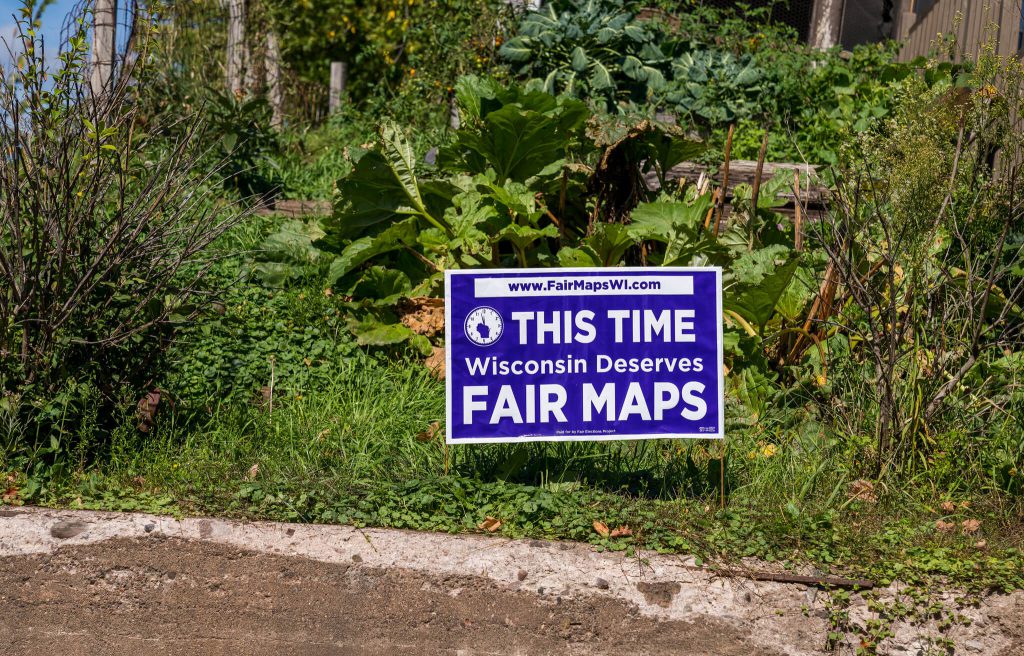State High Court Disallows GOP Congressmen’s Amended Political Map
But will consider amended maps by Evers and Black Leaders Organizing for Communities.

Wisconsin Fair Maps Coalition sign. Photo by Tony Webster (CC BY 2.0)
The Wisconsin Supreme Court ruled on Monday in a 4-3 decision that the state’s Republican members of Congress won’t be able to submit a new version of their proposed state political maps in the case to decide the boundary lines for the next ten years of Wisconsin elections.
The court’s three liberal-leaning justices were joined by conservative Justice Brian Hagedorn.
The congressmen were requesting the court to consider both the originally submitted map and the amended version as they take on the task of drawing new political lines — which is why the majority ruled the amended version wouldn’t be allowed.
Meanwhile, Evers and the progressive group Black Leaders Organizing for Communities (BLOC) filed motions to amend their maps while disregarding the maps they’d originally proposed. The court ruled that these amended maps would be allowed.
“Our order of November 17, 2021, provided that parties could submit only a single set of maps and provided a process by which parties could file a motion to amend their maps,” the court order states. “Consistent with our order, Governor Evers and BLOC brought motions to amend their maps. They ask us to disregard their initial maps and consider only their maps as amended. Because our prior order plainly contemplated this type of motion, both are properly granted. The Congressmen’s motion, however, is different-in-kind. It is not a motion to amend a previously submitted map. Rather, the Congressmen ask us to consider an alternative map while expressly standing by their initial map. In essence, the Congressmen ask us to accept two congressional maps from them, while accepting only one such map from every other party. This plainly runs afoul of our direction that each party may submit only a single set of maps.”
“Redistricting is a new challenge for this court, and as such I would accept all assistance from all parties,” Roggensack wrote in her dissent, which was joined by Justices Annette Ziegler and Rebecca Bradley. “The majority seems to hold this view for Governor Evers and the BLOC plaintiffs, but a different view for the Congressmen.”
The court also ordered that all the parties in the case must come together and agree on a standardized template for their proposed maps so the justices are assessing the merits of each proposal using the same scale and style.
The redistricting case is awaiting oral arguments and there is still a pending lawsuit in federal court but the new maps must be in place by the spring when political candidates for the fall elections must begin collecting signatures to gain access to the ballot.
Wisconsin Supreme Court rules Republican congressmen can’t submit amended map proposal was originally published by the Wisconsin Examiner.
More about the Gerrymandering of Legislative Districts
- Without Gerrymander, Democrats Flip 14 Legislative Seats - Jack Kelly, Hallie Claflin and Matthew DeFour - Nov 8th, 2024
- Op Ed: Democrats Optimistic About New Voting Maps - Ruth Conniff - Feb 27th, 2024
- The State of Politics: Parties Seek New Candidates in New Districts - Steven Walters - Feb 26th, 2024
- Rep. Myers Issues Statement Regarding Fair Legislative Maps - State Rep. LaKeshia Myers - Feb 19th, 2024
- Statement on Legislative Maps Being Signed into Law - Wisconsin Assembly Speaker Robin Vos - Feb 19th, 2024
- Pocan Reacts to Newly Signed Wisconsin Legislative Maps - U.S. Rep. Mark Pocan - Feb 19th, 2024
- Evers Signs Legislative Maps Into Law, Ending Court Fight - Rich Kremer - Feb 19th, 2024
- Senator Hesselbein Statement: After More than a Decade of Political Gerrymanders, Fair Maps are Signed into Law in Wisconsin - State Senate Democratic Leader Dianne Hesselbein - Feb 19th, 2024
- Wisconsin Democrats on Enactment of New Legislative Maps - Democratic Party of Wisconsin - Feb 19th, 2024
- Governor Evers Signs New Legislative Maps to Replace Unconstitutional GOP Maps - A Better Wisconsin Together - Feb 19th, 2024
Read more about Gerrymandering of Legislative Districts here




















